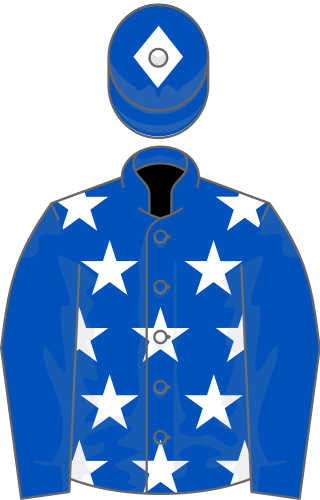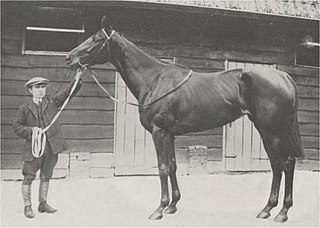Related Research Articles
Hula Dancer was an American-bred French-trained Thoroughbred racehorse.

Mysterious (1970–1988) was a British Thoroughbred racehorse. In a racing career lasting from July 1972 until October 1973 she ran eight times and won five races. Mysterious won Group races on her first four racecourse appearances including the Classic 1000 Guineas at Newmarket Racecourse and Oaks at Epsom. She later finished second to Dahlia in the Irish Oaks at the Curragh and won the Yorkshire Oaks at York.
Sweet Solera (1958–1978) was an Irish-bred, British-trained Thoroughbred racehorse. In a racing career lasting from June 1960 until June 1961, the unfashionably-bred filly ran eight times and won six races. As a two-year-old she was beaten in her first two races, but her five-lengths win in the Cherry Hinton Stakes at Newmarket Racecourse was enough to see her rated among the best juveniles of the year. Sweet Solera was unbeaten in four races including the 1000 Guineas at Newmarket and Oaks at Epsom. She was then retired to stud, and had some success as a broodmare.
Fleet, known in the United States as Fleet II, was an Irish-bred, British-trained Thoroughbred racehorse and broodmare who won the classic 1000 Guineas in 1967. In a racing career lasting from June 1966 until July 1967, the filly contested nine races and won five times. As a two-year-old in 1966, Fleet won two of her three races including the Cheveley Park Stakes and was the highest rated filly of her age in Britain. In the following year she won three races over a distance of one mile including the 1000 Guineas and the Coronation Stakes. When tried over longer distances she finished fourth in The Oaks and Eclipse Stakes. She was retired to stud where she had some success as a broodmare in Britain and the United States.
Pourparler was an Irish Thoroughbred racehorse and broodmare who won the classic 1000 Guineas in 1964. In a racing career lasting from the spring of 1963 until July 1964, the filly ran ten times and won three races. As a two-year-old, Pourparler won two important races in England and finished third in the Prix Robert Papin in France. In the following spring, she was beaten in her first two races before winning the 1000 Guineas at Newmarket. She was beaten in her two subsequent races before being retired to stud, where she had limited success as a broodmare.
Variation (1827–1847) was a British Thoroughbred racehorse and broodmare that achieved success in the racing world. In 1830, Variation made her racing debut by winning the classic Oaks Stakes at Epsom Downs Racecourse. Throughout her career, she participated in fifteen races and emerged victorious in eight of them. Her achievements included three match races, the Oatlands Stakes, and two editions of the Garden Stakes at Newmarket Racecourse. One of her notable victories came in the 1831 Garden Stakes, where she triumphed over a formidable field across a two-mile distance. Following her racing career, Variation retired in 1833 and subsequently displayed promise as a broodmare.
Waterloo was British Thoroughbred racehorse and broodmare best known for winning the classic 1000 Guineas in 1972. Waterloo was one of the leading British two-year-olds of 1971 when her wins included the Queen Mary Stakes and the Cheveley Park Stakes. In the following year she followed up her victory in the Guineas by winning the Falmouth Stakes. She was later sold and exported to the United States and had some success as a broodmare.
Full Dress was a French-bred, British-trained Thoroughbred racehorse and broodmare best known for winning the classic 1000 Guineas in 1969. Full Dress was beaten on her first two starts as a two-year-old but then won the Crookham Stakes at Newbury Racecourse. In the following spring she won the 1000 Guineas Trial Stakes at Ascot before surviving and objection to win the Guineas. She was beaten in her two subsequent races and was retired to stud where she had some success as a broodmare.
Night Off was an Irish-bred, British-trained Thoroughbred racehorse and broodmare best known for winning the classic 1000 Guineas in 1965. Despite running only twice in 1964 she was the top-rated filly in Britain after a win in the Cheveley Park Stakes. After recovering from illness to win the 1000 Guineas in April 1965 her form deteriorated, with a second place at Royal Ascot being her only notable performance in five subsequent races. She had some success as a broodmare, despite producing only five foals.
Fairy Footsteps was a British Thoroughbred racehorse and broodmare best known for winning the classic 1000 Guineas in 1981. She showed promise in her first two races as a two-year-old before establishing herself as one of the best fillies of her generation with an emphatic win in the Waterford Candelabra Stakes. In the spring of 1981 she was heavily backed for the 1000 Guineas before and after a win in the Nell Gwyn Stakes. She won the 1000 Guineas by leading all the way and was considered highly likely to follow up with a win in the Epsom Oaks but was retired after a disappointing defeat in the Musidora Stakes. She had some success as a broodmare.
One in a Million was an Irish-bred, British-trained Thoroughbred racehorse and broodmare best known for winning the classic 1000 Guineas in 1979. She won both her races as a two-year-old in impressive style and began her three-year-old season with a five length win in the Nell Gwyn Stakes. She won the 1000 Guineas as a short-priced favourite and was awarded victory in the Coronation Stakes on the disqualification of Buz Kashi. She lost her unbeaten record when finishing unplaced in the July Cup and never raced again. After being retired from racing she had considerable success as a broodmare. She died in 1992.

Scintillate was a British Thoroughbred racehorse and broodmare best known for winning the classic Oaks Stakes in 1979. She showed promising form as a two-year-old although she failed to win in three races. After recording her first win in the Sandleford Priory Stakes in the following spring she won the Oaks as a 20/1 outsider. She ran poorly in two subsequent races and was retired to brood where she had limited success as a broodmare.
Swiss Maid was a British Thoroughbred racehorse and broodmare, who was rated the best three-year-old filly in Europe in 1978. Unraced as a two-year-old, she won only one of her first eight races in 1978 and appeared to be some way inferior to the best horses of her generation. She then showed consistent improvement, winning her last four races of the season including the Sun Chariot Stakes and ended her year by decisively defeating a strong international field in the weight-for-age Champion Stakes. She remained in training as a four-year-old but failed to reproduce the form he had shown in the autumn of 1978. She made no impact as a broodmare.
The 2009 1000 Guineas Stakes was a horse race held at Newmarket Racecourse on Sunday 3 May 2009. It was the 196th running of the 1000 Guineas.

Fair Salinia was a British Thoroughbred racehorse and broodmare best known for winning the classic Oaks Stakes in 1978. In a racing career which lasted from September 1977 until September 1978 she won four of her eight races. As a two-year-old in 1977 she won on her debut before finishing second in the Cheveley Park Stakes. As a three-year-old she finished second in the 1000 Guineas before being moved up in distance and winning the Oaks, Irish Oaks and Yorkshire Oaks. She was retired to stud at the end of the season and had some influence as a broodmare. She died in 2004 at the age of twenty-nine.
Cherry Hinton was an American-bred, British-trained Thoroughbred racehorse and broodmare. Despite never competing above Group Three level, she was officially rated the best two-year-old filly in Britain, and was rated the best juvenile filly in Europe by Timeform. She ran well in defeat in her first two races before winning the Tadcaster Stakes at York Racecourse and then establishing her reputation with a wide-margin victory in the Argos Star Fillies' Mile. She was expected to play a leading role in the following season's classics but had a series of training problem and failed to win in three starts. She later had some success as a broodmare.
More So was an Irish Thoroughbred racehorse and broodmare. She showed considerable promise when winning her only start as a juvenile in 1977 and then took the Irish 1000 Guineas on her three-year-old debut. She won the Desmond Stakes later that year before being exported to the United States where she won the Palomar Handicap in 1979. Her subsequent North American career was disappointing and she was retired from racing at the end of the 1980 season. She made no impact as a broodmare.
Lovely Rosa was an Irish-bred, British-trained Thoroughbred racehorse and broodmare best known for her win in the 1936 Epsom Oaks. As a juvenile in 1945 she showed some promise when finishing second in the Queen Mary Stakes and winning a race at Newbury but then showed little worthwhile form until her 33/1 upset victory in the Oaks. She never won again and was retired at the end of 1936. She had some success as a broodmare, most notably being the grand-dam of Wilwyn.

Atmah was a British Thoroughbred racehorse and broodmare. She failed to win as a two-year-old but showed considerable promise on her final start when she ran third in the Dewhurst Stakes. In the following year she contested four of the five British Classic Races, recording her biggest success when taking the 1000 Guineas. She made no impact as a broodmare.
Brulette was a French-bred Thoroughbred racehorse and broodmare. After winning one minor race as a juvenile she emerged as a top-class middle-distance horse in the following year, winning the Prix Penelope and the Epsom Oaks as well as finishing second in the Prix Vermeille and fourth in the Prix de l'Arc de Triomphe. When campaigned over longer distances in 1932 she won the Prix du Cadran in France before being transferred to England where she won the Goodwood Cup and Jockey Club Cup. After failing to reproduce her best form in 1933 she was retired from racing.
References
- ↑ "Racing: Cape Verdi can boost her Guineas claims". Independent.co.uk . 20 August 1997.